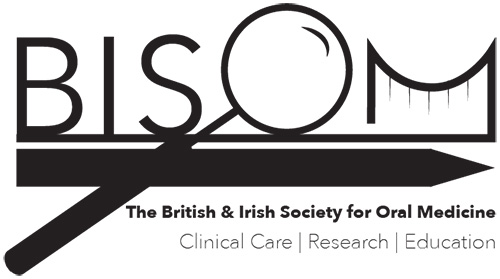Research
The BISOM welcomes and will promote where possible, high quality research that reaches evidence-based conclusions that helps patient care. Members of BISOM are involved in a wide range of research activities across the scope of Oral Medicine clinical practice.
Patient Outcomes
Understanding how conditions and their treatments affect patients is at the heart of patient-centered care. Clinician-completed scales and patient-completed questionnaires have been developed and validated in Oral Medicine Units in Kings College London, Birmingham and Cork Dental Hospital. These help the monitoring of chronic conditions where the focus of care is often on symptom control rather than cure.
Relieving Dry Mouth
Dry mouth has a negative impact on the quality of many people. It is becoming more common with time. Novel solutions to help relieve oral dryness are needed. Professor Stephen Porter and Dr Stefano Fedele at the Eastman Dental Institute, London are leading a clinical trial for a new treatment for mouth dryness. Tiny electrical currents are delivered to the mouth and the trial will test whether this increases mouth comfort. This has been reported in the national press.
Understanding Why?
Understanding the basis of why conditions develop is key to improving early detection and improved management. Research to improve the understanding of why diseases develop can take many forms. Epidemiological research studies identify risk factors, such as lifestyle choices or the local environment. These are very different from molecular research studies that aim to identify key disease-causing changes in cells. Both are applicable to conditions within the scope of Oral Medicine practice. These often involve multi-disciplinary research studies, particularly for systemic conditions such as Sjogren’s Syndrome and Behcet’s Disease.
Raising Clinical Standards in Oral Medicine
The British Society for Oral Medicine seeks to improve the quality of life of patients who fall within the scope of the specialty by promoting excellence in the 3 inter-related themes of:
- Clinical care
- Research
- Education
Ensuring Quality
Clinical governance and effectiveness frameworks ensure that patient care reaches the required standards. These activities go on within individual Oral Medicine units. The Society is developing a role in facilitating joint governance activities between units. For example, if someone has a common condition such as oral lichen planus it is reasonable to expect that the minimum standards of care are the same wherever the specialist care is being delivered. Joint Oral Medicine unit service evaluation, for less common conditions such as orofacial granulomatosis are also providing new insight that will shape future specialist care. The Society is represented at the Clinical Standards Committee that meets in London.
Treatment Choice – The Evidence
Choosing the best treatment for a patient can be difficult. Reviewing all the published evidence for a treatment or condition allows informed choices to be made in the clinic. Many BISOM members in different centres in the UK and Ireland have been involved in systematic reviews within the Cochrane Oral Health Group based in Manchester or participate in the World Workshops on Oral Medicine. These cover topics across the spectrum of conditions that fall within Oral Medicine practice.
There are some very effective treatments for conditions within the scope of Oral Medicine practice. However, there is a need for improved treatments. Research developments may involve investigation of how existing treatments are best used. This can focus on medicines, diet changes or psychological treatments, amongst others. New treatments are also being developed, but inevitably take longer to reach the clinic. Well-conducted clinical trials, for example that compare treatments, add to the evidence-base for choosing the best care for an individual.
Speeding up Mouth Cancer Detection
With mouth cancer rates increasing the need for non-invasive tests in the dental surgery to rapidly detect lesions that might be early cancers is greater than ever before. Professor Martin Thornhill in Sheffield along with colleagues in Rice University in the USA is undertaking a clinical trial using ‘lab on a chip’ technology for the rapid testing of mouth lesions that may be cancer. This gives an answer in around 20 minutes and has the potential to identify which patients need further tests soon.
This research study has been reported in the national press.
Defining Disease
For many conditions that fall within the scope of Oral Medicine practice there is not a simple ‘yes/no’ test that defines the condition. Some conditions are defined by a group of different clinical features or tests. Research to improve the definition of specific conditions helps the planning of future research studies. Sjogren’s Syndrome is an example where Oral Medicine staff from Kings College, London have contributed to an international study addressing these issues.
Trigeminal Neuralgia – Pain Control
Trigeminal neuralgia pain is so severe that it “stops people in their tracks”. The medicines used for this condition do not always work well-enough or have unacceptable side effects. There is a need for new drug treatments. Professor Zakrzewska at the Eastman Dental Institute, London is leading a clinical trial to see if a new drug has a role in the control of Trigeminal Neuralgia pain.
